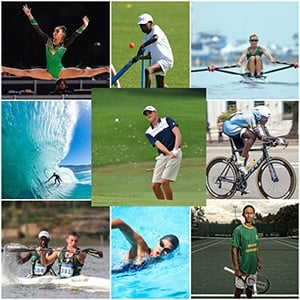
SA sports federations highlight the importance of the safe return of sports
Following the recent announcement regarding the regulations governing Alert Level 3, the financial survival of many sports in South Africa remains uncertain.
According to the latest guidelines released by government, professional non-contact sport will be permitted, which leaves many federations in a desperate financial battle.
All sports codes offer work opportunities at all levels from organised recreational to professional and many sports clubs, coaches, trainers, workers and semi-professional athletes face financial ruin should sport on all levels remain prohibited.
Gymnastics provides full or part-time employment to approximately 3 500 people countrywide, with golf providing approximately 40 000 jobs at facilities alone, and swimming an estimated 22 000 jobs. Close to 6 500 people are employed directly and indirectly in tennis.
Various sports federations recently came together to discuss the future and phased return to sport. These sports federations have put strong risk mitigation strategies and policies in place based upon international best practice and in line with government regulations. These non-contact sports codes include gymnastics, swimming, golf, rowing, surfing, canoeing, cycling, cricket and tennis.
For the sake of the survival of the sports economy during the Covid-19 lockdown, these federations have appealed to government to consider the economic and health impact of restricting organised sport in South Africa.
“The plan SAGF submitted includes the protocols we will be implementing across all our registered clubs in South Africa to ensure social distancing, regular sanitisation of gyms and education about combatting this virus to all its members, amongst other things,” said Anne Vermaak, CEO of the South African Gymnastics Federation.
“We urgently need our clubs back in business to ensure their financial survival.”
Richard Glover, the CEO of Tennis South Africa shares Vermaak’s sentiments. According to Glover Tennis SA has already started the Covid-19 coaching license application process for coaches. They are also conducting a province by province review of all venues.
“We are beginning to educate coaches on the strict health and safety, hygiene and social distancing measures that we will have to put in place with immediate effect,” he concluded.
“It is essential that we return to organised activity as soon as possible.”
Grant Hepburn, CEO of GolfRSA says, “Golf is a healthy exercise for families and people of all ages. It is also an excellent stress reliever and takes place outdoors in wide open spaces. The safe return of our golfers will mean that we can save thousands of jobs and dozens of facilities that contribute massively to the economy and to charity. We have a nationwide Risk Mitigation plan in place at all clubs and we are confident that we are well prepared for golf to resume as a safe and healthy exercise for everyone”
In terms of swimming and surfing, both federations have indicated that they are ready to return, with Swimming SA’s policy being finalised this week. Both sports are non-contact and is geared towards social distancing by its nature. For surfing, the only area of risk identified is when surfers transition into the ocean from the beach, rocks or piers - similar risks faced by runners, joggers, walkers and cyclists under the current regulations.
Cricket South Africa’s Maxwell Jordaan, who is their Transformation and Member Relations Executive, has produced a plan and the way forward under each of the four alert levels highlighted by National Government.
“Cricket SA is looking at the BioSafe Zone aka Bio-Bubble. This means that players will live and play in the same environment, while all the preventive measures will be ensured. Players, officials and support staff will be tested prior to entering this zone,” Jordaan said.
The participation in sport has known health benefits, including promoting physical fitness and mental wellness. Sports provide a social construct and interaction which is necessary in a time of uncertainty. It is widely recognised that physical activity, performed for the right amount of time and intensity can provide benefits to the immune system.
Failure to reopen all sports codes will indeed continue to hurt the already crippled sports industry.